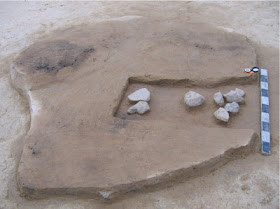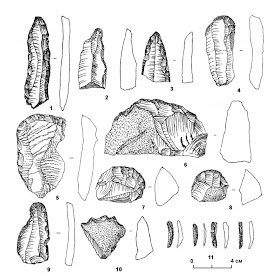 |
| Excavations at the Maibulak site [Credit: Web] |
The site in Zhetyssu is one of the few 'early man' sites in the world that has been preserved by a layer of soil. Excavations at the site have been in and out over the past 8 years.
 |
| Hearth. Cultural horizon III [Credit: Web] |
According to the researchers, the site is over 35,000 years old. Scientists are already finding samples that may become a sensation.
 |
| Palaeolithic stone tools from Maibulak [Credit: Web] |
Experts noted that such sites are a basis for the hypotheses that the territory of Kazakhstan was part of the "road to the East" during migration of the population around the world.

No comments:
Post a Comment